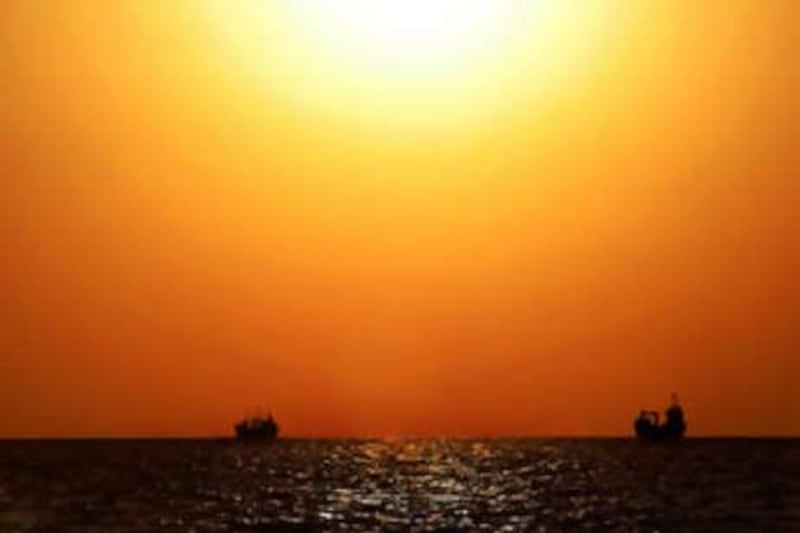TEHRAN // The Iranian army chief warned today that his country would shut the Strait of Hormuz if its interests were threatened, the Fars news agency reported. "All the countries should know that if Iran's interests in the region are ignored, it is natural that we will not allow others to use it [the strait]," Gen Hassan Firouzabadi was quoted as saying. The strait between Iran and Oman's Musandam peninsula is a vital conduit for energy supplies, with as much as 40% of the world's crude passing through the waterway.
However, Iran's armed forces joint chief of staff stressed his country's priority remains that "the Strait of Hormuz be open". His threat repeats comments made by the commander of Iran's Revolutionary Guards, Mohammed Ali Jafari, more than a week ago, when he said Iran will definitely act to impose control on the Gulf and Strait of Hormuz if attacked. Speculation has been on the rise that Israel could be planning a military strike against Iranian nuclear sites, using force to halt Tehran's controversial atomic activities. The commander of the US Navy's Fifth Fleet, Vice Admiral Kevin J Cosgriff, said last week that his forces would not allow Iran to close the Strait of Hormuz.
President Bush has not ruled out using force in the nuclear standoff between Iran and the West, but emphasised that he preferred a diplomatic solution. Iran insists its atomic drive is peaceful, but Western powers fear Tehran is using the programme to develop nuclear weapons. The country's oil minister said today that any military attack aimed at curbing Tehran's nuclear work would push crude prices to "unpredictable" highs.
In a statement on the Oil Ministry's website, Gholamhossein Nozari said: "When oil prices change by $10 to $15 by official comments [about the market], oil prices will be pushed to unpredictable highs if some take an unwise decision to attack Iran." Mr Nozari likened talks on attacking Iran to a "joke". "Any military attack on Iran will have a strong and unimaginable response from the country," he added.
The developments come after considerable speculation in recent days that Tehran was softening its tone on the nuclear standoff, although the international community has made negotiations conditional on enrichment suspension. Crude prices fell more than a dollar yesterday when Iran said it would respond to an incentives package offered by six world powers to try to resolve a long-running dispute over its nuclear development programme. Iran is ready to negotiate with world powers on its nuclear programme but without suspending its controversial uranium enrichment work, the government spokesman said today. "Iran will not go back on its rights on the nuclear issue," Gholamhossein Elham said, in the first comments from Tehran since it handed over a response on Friday to an international bid to end the nuclear standoff. Yesterday, Iran delivered its response to a package drawn up by six world powers offering Iran technology and negotiations if it suspends uranium enrichment, which the West fears could be used to make atomic weapons. Mr Elham said his country was prepared to hold talks "especially with the 5+1 Group" of the UN Security Council members plus Germany "on the common points in the Iranian package and the offer of the world powers". Saeed Jalili, Iran's top nuclear negotiator, said his country had submitted a "constructive and creative" response with "a focus on common ground," but he did not elaborate on the contents. Iran has also put forward its own more all-embracing offer aimed at solving world problems, including the nuclear issue, and has said there is common ground between the two packages. Diplomatic sources said the EU foreign policy chief Javier Solana has not ruled out a period of pre-negotiations during which world powers would refrain from new sanctions provided Iran did not start operating any more centrifuges to enrich uranium. *AFP/Reuters





